Why Eustress Is Good for Your Mind and Body
Types of Stress | JDN Tuition | Examples of Eustress
Whenever we hear the word “stress”, a familiar cascade of negative feelings often follows. When it comes to stress, burnout, anxiety, sleeplessness, or endless to-do lists come to mind. But what if there’s another side to the picture? Here it is, not every stress is detrimental to your well-being. You would be shocked yet happy to hear that there’s a type of stress that is actually healthy for you– that is exactly what eustress is: good stress. Eustress can be a hidden ally in your life, and it can act as a secret ingredient to discover resilience, creativity, and motivation in your life.
This blog will serve as a guide to what eustress is, provide examples of eustress, outline its wonderful benefits, and explain how to harness the power of eustress.
What is Eustress? An Introduction to Positive Stress
An endocrinologist named Hans Selye, who is also the pioneer of stress research, coined it as “eustress.” The term is a combination of two words, “eu” and “stress”. The word ‘eu’ originates from the Greek word meaning good, the same prefix and root found in the word euphoria. Therefore, eustress basically translates into ‘good stress’. According to a clinical psychiatrist, we don’t really think of stress as a positive thing, but eustress is just that— positive stress. Eustress is characterised as a product of nerves, which arises when you come across some fun challenges.
Eustress vs Distress
Unlike its dark side, distress, which drains us or overwhelms us, eustress positively challenges us, encouraging a positive mindset. You can think of this concept as two ends of a spectrum. One end of the spectrum contains distress, which involves negative feelings and is often associated with damaging experiences. And then comes the other end of the spectrum, that is eustress– challenging yet rewarding. In easy terms, eustress is a sweet spot between comfort and chaos. Excess of comfort leads to boredom, whereas excess stress leads to breakdown– but eustress is where personal growth happens.
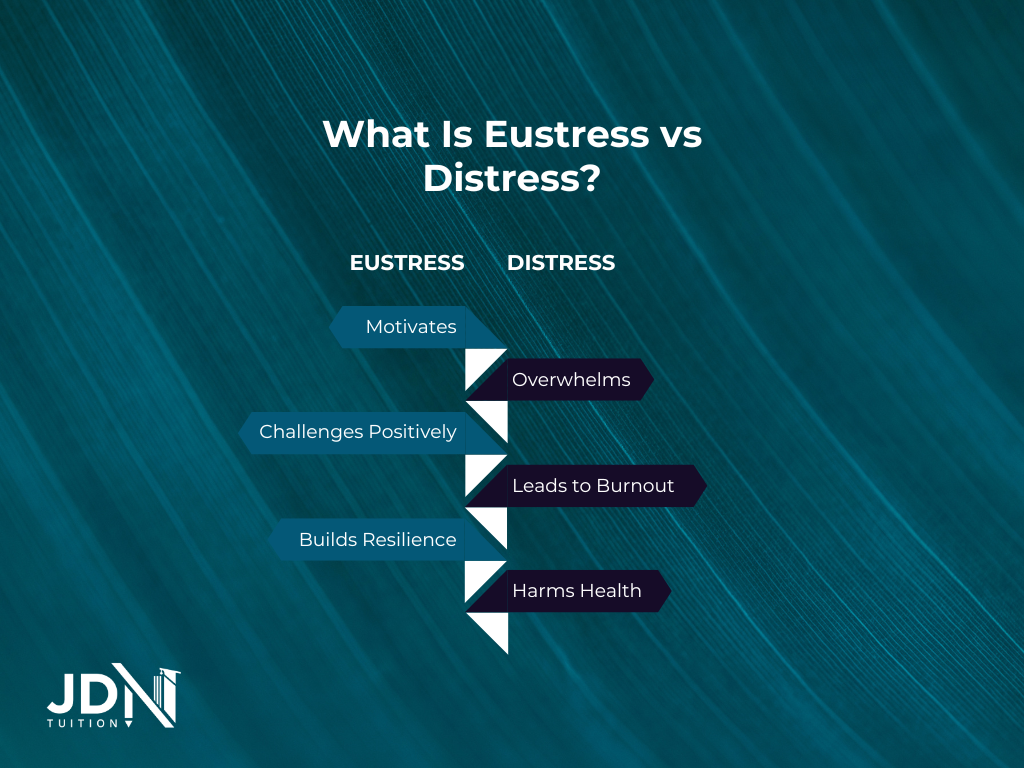
What Makes Eustress Good? The Science of Good Stress
To understand why eustress is good, you need to understand what goes on in your body and brain during stress. When you come across a difficulty or challenge, your body faces a cortisol and adrenaline rush as a stress response. During stress, or more specifically, distress, these hormones stay elevated, causing harm to your immune system or mood. Contrary to this phenomenon, during eustress, the release and elevation of these hormones is steady and balanced. However, the stress hormones are still elevated, and you feel excited as the good stress happens. This steady release of hormones provides just enough stimulation to motivate you and sharpen your senses without overwhelming you. When it comes to students, eustress empowers them and helps them build resilience. Some other physiological responses include increased memory consolidation, improved decision-making skills, and enhanced alertness and reaction time.
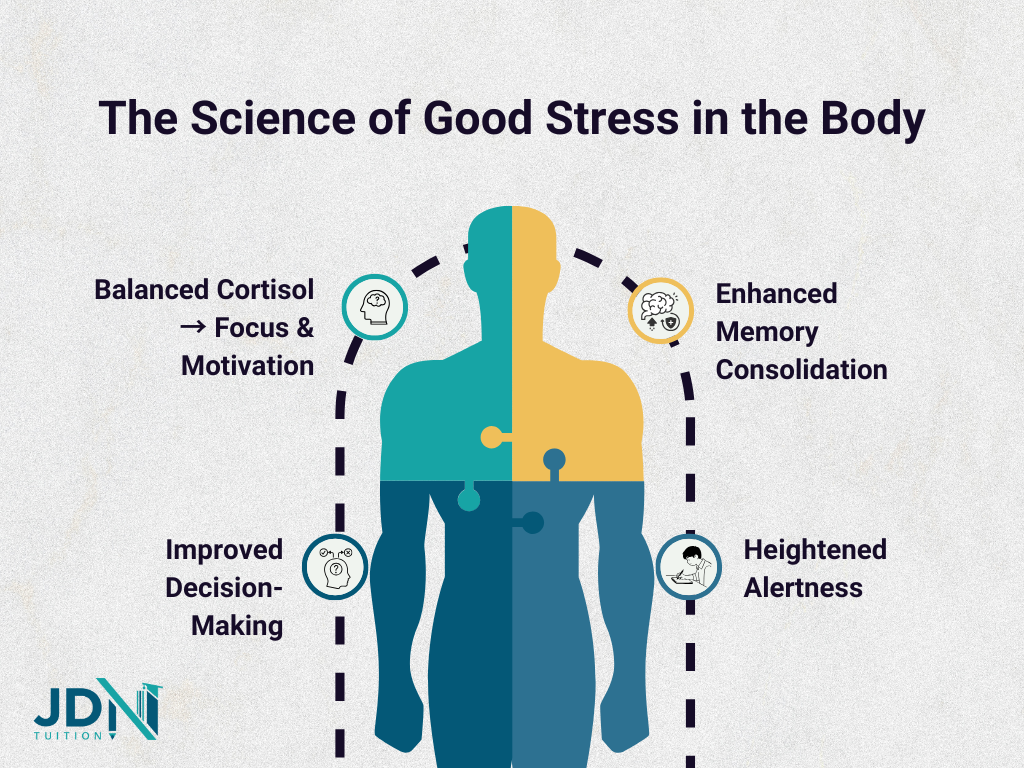
Now, let’s discuss that in terms of how students can experience good stress. Or how, as a student, you can transform your distress into eustress. Students can face eustress when they feel confident about their abilities to ace their exams or solve any problems coming their way. For instance, students might feel stressed about an exam, but deep down know that they are well-prepared to score well. Afterwards, they might also have a sense of accomplishment and pride. Contrary to this, distress happens when a student feels out of his depth, or he finds himself unable to do well in exams. Therefore, if you have not prepared enough for a forthcoming exam, you might get panicked or anxious.
A Psychologist’s Perspective
According to a well-known psychologist, Dr. Kara Fasone, eustress is just about sufficiently challenging yourself with minimal expenditure of your resources. This type of stress helps empower you in three major areas: emotional, physiological, and physical. Emotionally, eustress makes us think positive thoughts, such as motivation, contentment, and inspiration. When it comes to the physiological aspect, good stress helps our physical health. Lastly, psychologically, it helps maintain our self-efficacy and autonomy. This is how eustress and distress are different: good stress from bad stress.
The Major Benefits of Eustress
Here’s where the story gets its climax. Eustress is not just ‘not bad stress’- it is even really good for you. Let’s explore some of the surprisingly good benefits of eustress. The following are some of the benefits;
- Enhanced Creativity and Problem-Solving Skills
- Strengthened Social and Emotional Skills
- Improved Academic Resilience
- Better Physical Health and Immunity
- Enhanced Motivation
1. Enhanced Creativity and Problem-Solving Skills
To boost your creativity, you often need just the right amount of pressure. Most of the artists or writers often report that deadlines, competitions, or a rivalry fuel their creativity and ignite their most creative and brilliant ideas. You must be wondering how this happens. It happens because positive stress strengthens focus while allowing your brain to think out of the box.
In the Australian context, creativity is a highlighted skill in Australia’s General Capabilities framework, which emphasises critical thinking. This process is often referred to as the ‘creative sweet spot’- a mental state where the urgency of a task introduces you to a fresh perspective instead of shutting you down.
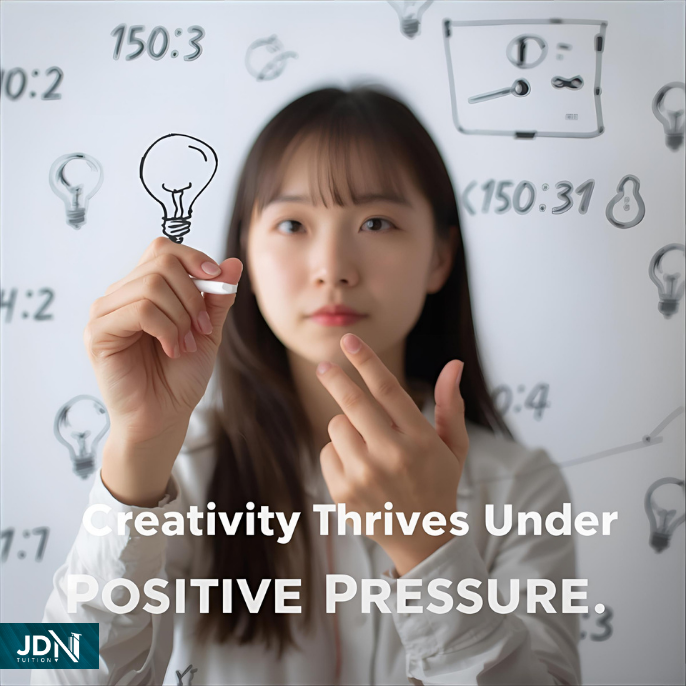
2. Strengthened Social and Emotional Skills
The right amount of pressure helps strengthen your social and emotional skills. It especially plays an important role in reshaping the cognitive function of students. Eustress is an amazing catalyst for your social and emotional growth. Although the Australian education system promotes social and emotional learning, exposure to the right guidance will help pave the way to better emotional regulation. The good stress helps build social and emotional skills by acting as a positive challenge. This, in turn, helps encourage better emotional regulation, builds resilience, and promotes prosocial behavior. Group projects, extracurricular activities, and leadership opportunities in schools create good stress that fosters empathy, compassion, and teamwork. Additionally, ongoing scientific research shows that good stress positively impacts memory.

3. Improved Academic Resilience
One of the most significant benefits of eustress is its ability to enhance academic resilience in students. Let’s think of it this way: when you face a difficult situation, it helps you learn more about yourself, your abilities, and your limits. As you become confident in what you are capable of, you’re more likely to feel able to tackle stressful situations. This, in turn, builds resilience. Similarly, the right study techniques and competency-based assessments create a sense of challenge, which promotes good stress. This good stress helps build academic resilience in students. That’s why learning is important: it not only helps you gain knowledge but also strengthens your ability to manage challenges effectively. For example, a Year 12 student who has prepared adequately for exams feels confident in achieving good grades.
For example, “Honestly, JDN’s HSC tutoring was a lifesaver. As a Year 12 student, I was overwhelmed by HSC Chemistry. My tutor broke down tough concepts and gave me practise papers. I ended up with a Band 6 and got into Medicine!” said Jessica Tan, a Year 12 student. Through practise papers, her tutor at JDN Tuition induced positive stress, which in turn gave a boost to her performance.

4. Better Physical Health and Immunity
The effects of stress on immune function have been studied extensively. Eustress positively impacts both physical and mental health. Its benefits regarding mental health are fine; however, the concept of physical health benefits might sound counterintuitive. Small chunks of manageable stress help improve circulation and strengthen immune function. For example, some types of stressors, like exercise-induced stress, help with cardiovascular health. Just like that, cold showers or intermittent fasting, known as hormetic stressors, help train the body to adapt and grow stronger. Such short-term stressors help enhance your body’s ability to deal with illness and injury. In addition to this, a recent research study shows that positive stress improves immunity in people with infections and wounds. You can say that, in moderation, stress acts as a small challenge that helps build long-term resilience in your body. In short, a healthy lifestyle helps promote eustress.
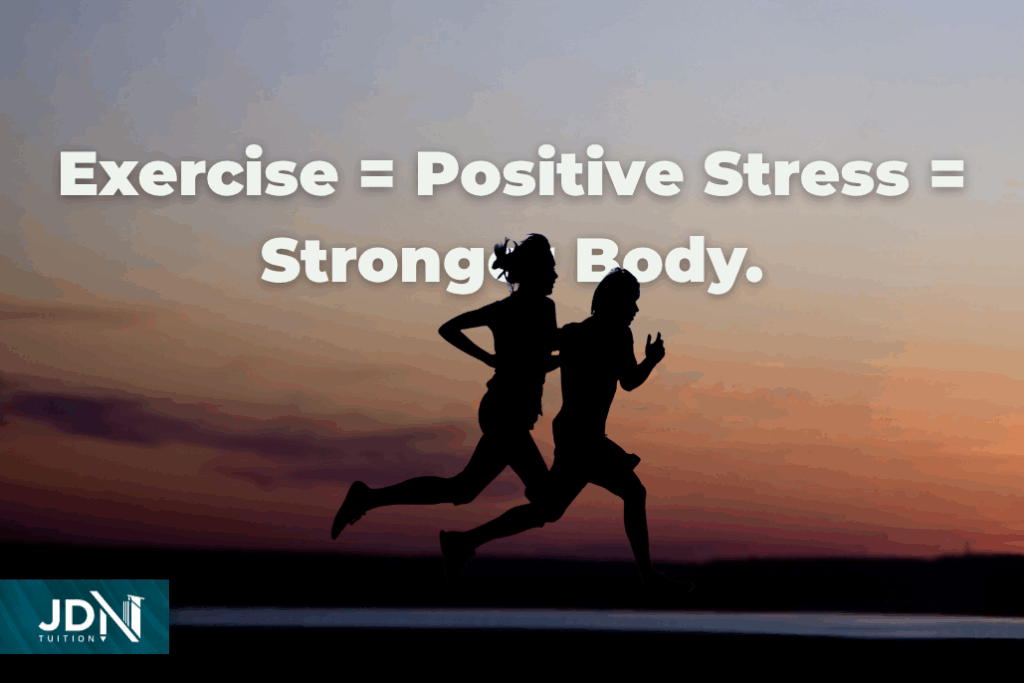
5. Enhanced Motivation
Do you ever notice that a looming deadline suddenly turns you into a work machine? That is exactly what eustress is at work. This positive stress plays an important role in boosting motivation and enhancing mental health and well-being. In contrast to distress, which drains your energy, good stress stimulates the body’s fight or flight response in a steady and balanced manner. This helps push individuals to face challenges with confidence instead of being overwhelmed during stressful times. This heightened state of alertness boosts motivation, and it also helps with stress management in difficult times.
For instance, coming across a challenging situation in the workplace can induce pressure. This mild pressure turns into eustress that inspires individuals to learn new skills to improve career success and personal growth. Eustress fuels your intrinsic drive to work better and keeps procrastination at bay. For example, preparing for a public speaking session or presentation activates your body’s sympathetic nervous system. As a result, it sharpens your focus and drives you to do your best. In short, you can say that, without eustrss, life can get monotonous. These small bursts of challenge keep the spark and excitement alive.
Examples of Eustress
Yes, you heard it right. You can intentionally add good stress into your life. You can challenge yourself by setting some goals or through various activities. This will promote positive stress in your body to do better. It redefines your ability to deal with stressful situations in your life. Here are some of the real-world examples of good stress;
- Taking on a new work project that makes you excited is an example of good stress. When you get the responsibility of a new work project, you get a chance to show your skills and channel your confidence. When everything falls into place, it leads to a thrilling experience.
- Challenging yourself in the gym is a great example of stressing yourself positively. When you are trying to lift more weights than you usually do, it brings excitement and stress that positively impact your body and brain.
- Raising a child is an example of eustress for parents. For parents, adapting to parenthood is stressful; however, it is a deeply rewarding experience, and it helps foster growth and resilience.
- Launching a startup is a tiring yet thrilling experience for an entrepreneur. Though building and launching a startup is filled with uncertainty, the excitement of creating something new keeps the spirit high.
- Visiting a new place or country can be tough due to the stress of managing all the things. However, this exciting travel experience creates eustress.
How to Harness the Power of Eustress?
Now that you are aware of the benefits of eustress, the question is: how can you harness the power of good stress? Here are some practical ways you can tap into good stress;
- Set challenging yet achievable goals. For instance, asking a student to complete his assignment in one week instead of 10 days. Think of it as setting a treadmill to the right speed: fast enough to make you sweat but not too fast that you fall.
- Reframing stressful situations into exciting experiences is one of the ways to invite good stress into your life. For example, instead of saying “I am very nervous about this assessment,” try to reframe it by saying, “I am very excited to see how prepared I am for my exam.” This simple shift transforms fear into fuel.
- Practicing controlled, intentional stressors helps our body and mind in so many ways. For example, after completing a lesson, solving its exercises helps sharpen your mind. In addition to that, fasting, cold showers, etc, help build resilience in your body.
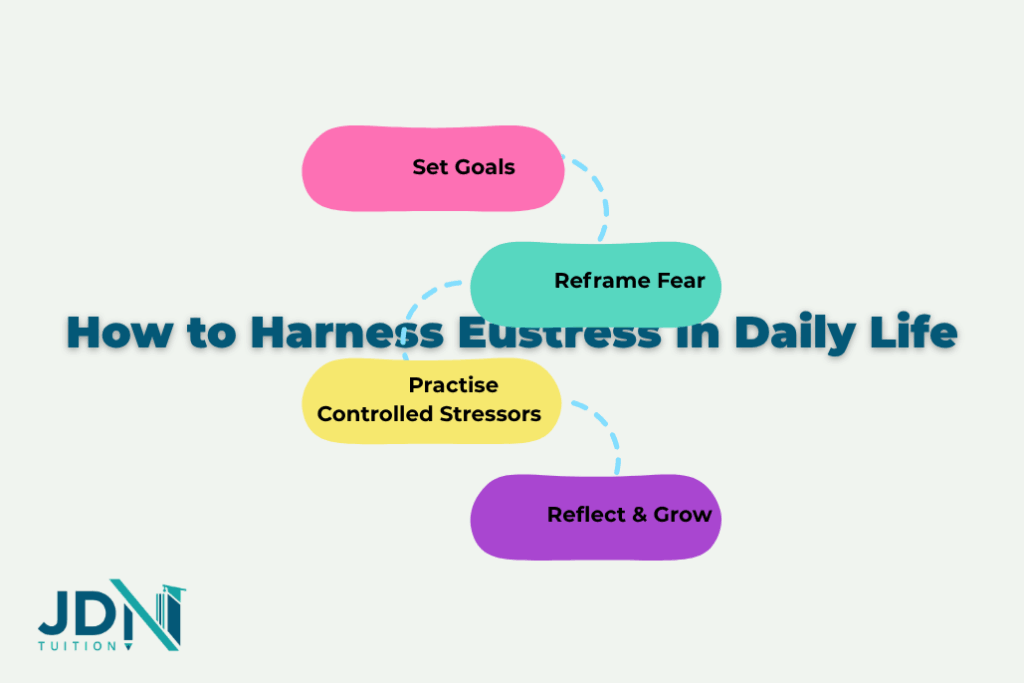
Conclusion: Benefits of Eustress in a Nutshell
Eustess is just like an unsung hero when it comes to our personal and professional growth. Stress in the right dose acts as a superpower instead of being a villain in your life. From motivating us to achieve and fueling our creativity to building resilience and strengthening our social skills, it helps us in unimaginable ways.
Therefore, the next time you feel that fluttering sensation in your stomach, pause before labeling it ‘stress’. It might just be a positive thing knocking at your door– came to help you grow, stretch, and thrive.
Eustress is not your enemy; it’s your inner coach pushing you to become your best.
How JDN Tuition Helps Turn Pressure into Progress?
Let JDN Tuition turn overwhelming moments into opportunities for growth. AT JDN Tuition, we believe stress does not have to hold your child back when it can actually propel him forward. By offering the right balance of support and challenge, we help students harness the power of eustress. Through our personalised approach, we help every kid to learn at their own speed, in their unique way.
Whether it’s preparing for exams, grasping difficult subjects, or improving confidence, JDN Tuition guides students to see challenges not as hurdles, but as stepping stones towards success. Contact us and make the best decision today. You can also visit our blog page to have detailed insights into various interesting topics. Stay connected with JDN Tuition—follow us on Facebook, Instagram, and LinkedIn for tips, updates, and student success stories.
Want to Secure Your Child’s Future?
📞 Book a FREE Consultation Call: (02) 7257 0299
📧 Email us: [email protected]
FAQs
What are the 4 types of stress?
The four major types of stress are Time Stress, Anticipatory Stress, Situational Stress, and Encounter Stress. Time stress comes from having too little time and too much on your plate. Anticipatory stress arises from anxiety about future events. Situational stress arises from being in a scary or unforeseen situation or event. The encounter stress comes from awkward social interactions or dealing with difficult people.
What are the 4 D’s of dealing with stress?
The major 4 D’s of stress are Demand, Duration, Detail, and Degree. These 4 D’s describe how stress builds based on pressure or intensity of challenge. Detail comes from the complexity of the challenge and task, how long stressors last (Duration), and the intensity of pressure (Degree). All of it joins hands to assess and manage stress effectively.
How can you prevent stress?
You can prevent stress by maintaining a healthy lifestyle through regular physical activity, a balanced diet, and adequate sleep. Practising stress management techniques like relaxation therapies, mindfulness, meditation, and deep breathing helps calm the mind. Seeking social support from friends and family can also help manage it.
Can eustress improve exam performance?
Yes, eustress helps improve the exam performance of students. It helps keep them alert, motivated, and focused without causing anxiety. By inducing a sense of challenge rather than fear, eustress helps improve memory and concentration, thus improving exam performance.
What is the difference between eustress and distress?
The key difference between eustress and distress lies in how each of them affects a person’s mindset and ability to cope. Eustress is positive stress that enhances performance and motivates students. On the other hand, distress is negative stress that causes anxiety and inefficiency, hindering performance.





